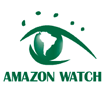Chevron Winners Urged to Return Conservation Cash
Don't Let Chevron Dodge Rainforest Abuses, Warns Amazon Watch

Amazon Watch
3 November 2005 - FOR IMMEDIATE RELEASE
Contact: Karen Hinton at +1.703.798.3109
San Francisco - Chevron's Ecuador problem came back to haunt it again today as the six recipients of the company's "conservation" awards received a letter from an environmental group asking them to return their cash prizes to the oil giant.
The letter, from Amazon Watch, warned the prize winners that their acceptance of the awards risked helping Chevron greenwash its image and switch attention away from what several experts believe is the world's worst oil-related environmental disaster. From 1964 to 1972, Texaco (now Chevron) dumped into Ecuador's rainforest more than 30 times more crude than the Exxon Valdez oil spill, poisoning the precious ecosystem and threatening local indigenous tribes with extinction. A clean-up is estimated to cost at least $6 billion, according to the American firm Global Environmental Operations.
"Chevron's hypocrisy in bestowing environmental awards while refusing to take responsibility for its own despoiling of the environment in Ecuador's Amazon rainforest is truly breathtaking," states Atossa Soltani, Amazon Watch's Executive Director, in the letter to the awards recipients.
"As one environmentalist to another," she continues, "I urge you to return your award money to Chevron or to find an organization in Ecuador that is fighting Chevron's irresponsible behavior, and to donate your award money to that organization. Part of Chevron's profits have come from the ransacking of one of the richest ecosystems on earth and through the trashing of the human rights of the local indigenous and farmer communities who live in this region of Ecuador."
Chevron CEO David O'Reilly awarded the prizes last week under heavy security at Chevron's world headquarters in San Ramon, California, where approximately 25 people protested outside and handed out "destruction" awards to mock company executives for refusing to clean up the Ecuador contamination. The ceremony was not open to the press and the company refused to invite many environmental organizations, including Amazon Watch, which for the last three years has mounted a campaign among shareholders and other groups to convince the company to clean up its Ecuador contamination.
The trial against Chevron, which started in October 2003 in the Ecuadorian rainforest town of Lago Agrio, is expected to conclude in 2006. It is the first environmental trial in Latin America where a U.S. multinational has had to answer to charges brought by rainforest dwellers in their own court system.
Separately, Ecuador's national prosecutor has opened up an investigation of company executives for possibly defrauding the Ecuadorian government during a much-criticized remediation attempt in the mid-1990s.
The winners are the Indonesia-based Orangutan Foundation International (OFI), which campaigns to save the rainforest habitat of the endangered great ape; the Solar Electric Light Fund (SELF), of Washington DC, which promotes small-scale alternative energy solutions for developing nations; the Pandrillus organization, which works to save the threatened drill monkey in western Africa; Mexico's Programa de Manejo Sostenible de Ecosistemas, which researches and protects the natural habitat of two endangered species of parrot; Vancouver-based Project Seahorse, which campaigns to save seahorse species around the world; and the International Society for the Preservation of the Tropical Rainforest/Preservation of the Amazonian River Dolphin, based in California.
In her letter to recipients, Ms. Soltani warned these organizations that their good work was at risk of being exploited by Chevron to dodge its responsibilities in Ecuador. She writes: "Our purpose in contacting you is ... [not] to question your vital contribution to the environmental cause. Instead, we merely seek to make Chevron live up to its green rhetoric and imagery and to do the decent thing by cleaning up the mess it left behind in Ecuador."
The letter comes as the latest blow to Chevron, as its brand name is increasingly tarnished by the scientific evidence being produced at the Ecuador trial, brought by 80 communities and five indigenous tribes. "So far, the evidence from this process is overwhelmingly against Chevron, with toxic pollutants in these samples frequently exceeding international and national standards by orders of magnitude," writes Ms. Soltani. "Even data collected by Chevron's own experts has shown excessive and illegal levels of contamination. Yet, however improbably, Chevron continues to insist that it is winning its case, and that it has nothing to answer for in Ecuador."